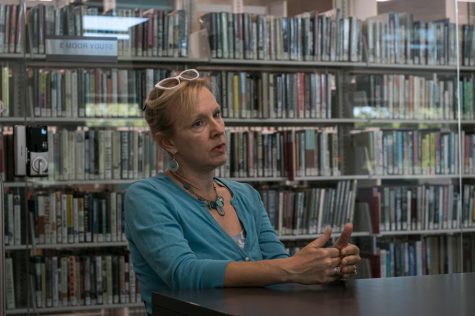Interview with USD497 Lawrence Public Schools Board of Education President Shannon Kimball
September 15, 2022

On Aug. 31, senior reporter Alicia Narum spoke to the USD497 Lawrence Public Schools Board of Education President Shannon Kimball about issues regarding the district and the board’s plan of action. Here is the following interview;
Can you please tell me about some of the issues the board is discussing and how you plan to go about them?
We are continuing conversations about our budget, and about our strategic plan goals, and particularly about how we are able to adequately fairly compensate our certified and classified staff.
Last spring, we had a lengthy process where we had to make a lot of budget cuts. In part, those were to deal with a deficit. We weren’t getting as much money from the state as we had budgeted to spend last year and so we had to make budget cuts in order to make the budget balanced by the end of the fiscal year. In addition to those cuts, which were not quite $5 million, we made additional cuts over and above that so that we would have money to allocate toward raises for our certified and classified staff.
If you review the materials from this meeting we just had on Aug. 22, there’s a discussion at the end of the meeting that was led by two of our teachers that are on the negotiations team, talking about wages and how our salary schedule for certified staff compares to salary schedules and other districts. It really confirmed what we’ve all been saying, and in very stark terms, which is that we are falling further and further behind in pay for our staff compared to all the districts around us and the districts that we compete with for employees, maybe with the exception of Eudora, but otherwise, we’re falling behind everybody else. And we’re seeing that. It’s certainly something I’ve heard anecdotally from teachers year after year after year, that they can leave USD 497 and go make substantially more money doing the exact same job in a nearby district. We really have a lot of work to do.
While we are going to hold the base stadium for people next year is going to go up, we are declining in enrollment. The increase in state aid is not going to offset that decline in enrollment and neither of those things are going to generate enough money for us to put meaningful dollars toward wages for our staff. We are going to continue this year to talk about how we reorganize the district in our operations in a way that frees up resources that we can put toward those priorities.
How are you planning to navigate decisions regarding budget cuts?
We hired a company called RSP Associates. We’ve worked with them in the past. They have done enrollment projections and planning for us in the past, but have the capacity to do other planning services. So we’ve engaged them to help us do a master planning process that looks at our enrollment now, our projected enrollment, the physical resources we have in our district, our buildings, locations of our programs and then go through a process where we have a group from fret that’s composed of members of the community and staff, things students and families to engage with that information and provide feedback, along with their expertise at RSP and some work that we’re having done to evaluate the condition of our facilities. That’s more like engineering work and architectural, architectural work. Bring all that together, and make some recommendations to the board about how we could reorder operations to meet our student’s needs, but perhaps spend those dollars more efficiently so that we can really make some meaningful progress on certified classified staff.
Apart from budget cuts, what other challenges do you anticipate seeing this term?
I see a lot of legislative challenges, frankly, coming from what might happen in both in the governor’s race and what might happen once the legislative session starts in January. There were a number of bills that Governor Kelly vetoed last session that from what I’m hearing are expected to come back and none of them are supportive of public education. Things like the “Parent’s Bill of Rights” [SB 58; Parents’ Bill of Rights] , which was really misnamed. It’s not a parent’s bill of rights. It’s a try to be prescriptive and tell our teachers how to do their job, piece of legislation. The bill about transgender student athletes [SB 160; Fairness in Women’s Sports Act], not allowing them to participate in sports in the gender that they identify. [We] fully expect that one to be back, and that only did not become law because the Governor vetoed it. The outcome of the governor’s election in November could potentially highly impact some of the things that we will be possibly facing legislation coming [in] January.
There were several things in legislation that passed last session that are going to have policy impacts on us already, [including] the district’s ability to use certain survey tools with students [and] around how we do our budgeting process [HB 2567; K-12 Education Appropriations and Other Provisions]. We’ve already had to go through some extra unnecessary hoops to pass our budget this year. There’s the open enrollment bill [HB 2567], which basically said that starting in another school year, we have to take students from outside our district if we have capacity to take them. The district has to adopt rules and policy around how we make those decisions. There’s already some things that are impacting and taking time away from what really ought to be our other priorities, [the] more important priorities of providing education to our students.
You mentioned that this upcoming election is going to be very important, especially with the legislation that’s being proposed. How is the board preparing for that, do you have ideas or processes set in place in case some of these things are passed?
We have a process in place where we put together a legislative agenda for our district and then we share that with our local legislators and also other legislators on the committees that work for public education. In years past, that process has started in November and December. We’re actually going to be talking about that it our Oct. 12 meeting. If not that one, then definitely the second October meeting. We’ll be having our first conversation about it, at the beginning of October to review and provide input onto into what our district’s legislative priorities should be. Those should be available on our website from last year.
But we took a position, for example, against the legislation around banning transgender students from participating in athletics. You know, we have positions around increased funding local control for our board being able to make decisions for our community in our district, things like that. I think that you’ll see us continue to advocate for those positions as we discussed and adopt our own legislative priorities.
We also communicate with our Douglas County legislators who have been very supportive of public education and will continue to do that. Some board members on our board, myself being one of them, participate in a number of activities at the state level around public education advocacy. We will anticipate continuing to do that to try to push back against some of those harmful pieces of legislation.
What would you say the board’s top three priorities are currently?
I’m continuing to support and monitor our strategic plan goals around student achievement [which includes] reading proficiency by third-grade, math proficiency by eighth grade, graduating, and [becoming] career and college ready.
After that being the number one goal, making sure our district is in a solid financial position. So working on increasing our reserve funds for emergencies and then figuring out how to reallocate some of our spendings to support our economic priorities.
The third priority would be increasing wages for classified and certified staff. Those three kind of all work together, but those are the top three things that we’ve been talking about, and we will continue to talk about.
Is there anything else that I or the student body should know?
We will continue to do our best to make decisions that support what you need. Sometimes that’s really hard, but it is always our focus, and I very confidently say that it is the focus of every board member on our board. We want you to have the best experience that we can provide.
We’d like to hear from students. I always appreciate getting emails from students about issues that you care about. Students shouldn’t feel like they can’t contribute their voice to those conversations too, because we do listen and pay attention.







